The long-awaited launch of ‘Penumbra’, the winning design from Haworth’s Celebrating Great Design Contest, has the A+D world enthralled!
When I asked each individual of the winning design team to characterise their entry for Haworth’s Celebrating Great Design Contest, these were the six words they believed captured the form, philosophy and function of Penumbra best (some found it hard to isolate their response to just one word – I hardly blame them). And, while each word may seem to have very little in common, together they actually create a narrative which expertly describes the design journey both the team and the prototype have traversed over the past year.
Officially launched recently in Sydney, Penumbra – the winning design created by designers Jess Dootjes, Brittany Pearce, Sue Fenton and Josh Carmody – is a furniture system that directly responds to the increased demand for flexible, versatile design solutions to empower collaborative environments in the workplace. From the creative visions of three interior designers and an architect, each of whom carry an impressive pedigree and degree of design nous in Woods Bagot’s commercial sector, Penumbra has been rightly applauded by the Asia Pacific architecture and design community for its insistence that the future of work is going to be people-oriented.
According to interior designer, Sue Fenton, “Penumbra was always conceived around the idea of providing designs that could foster more collaborative working models.” The growing demand for more collaboration-friendly design solutions is a sentiment that is being echoed widely across the commercial sector over the past handful of years, and one which ringed in 2017 across international media to a large extent. Of some of the most heavily shared articles online in January this year was Forbes’ ‘Create a Culture of Collaboration’, and Harvard Business Review’s ‘Getting Your Stars to Collaborate’. Both articles extolled the virtues of more openly collaborative working models leading to an economising of resources across boundaries to achieve holistic results, while also allowing organisations to solve problems more creatively, increasing corporate and individual productivity – all in turn leading to yielding higher profit-achievements that both attract top-tier talent (internally) and build foundations for top-tier clientele (externally). That ‘collaboration’ is becoming more and more in demand is indisputable … but that we’re designing solutions that have fostered it correctly is another question altogether:
“Time spent in collaborative activities has grown by 50% or more over the past 20 years. Yet only 14% of leaders are completely satisfied with their organisation’s current ability to communicate and collaborate” – Shani Harmon and Renee Cullinan, Forbes Magazine.
This is the climate Penumbra now enters: overstretched teams who have hitherto been required to work autonomously, a workforce which cherishes and understands the value of collaborative collisions (yet also finds them increasingly rare to happen across), and management teams which despair the opportunity for and access to a workplace behavioural model that harbours the potential to benefit productivity exponentially. “At this point”, says Penumbra’s Josh Carmody, “we decided to zero-in on the important functional requirements for collaboration in an increasingly agile workplace to design a range of furniture that facilitated flexible and responsive working environments.”
It’s a winner! Whether facilitating collective workplace norms or focusing on offering a myriad of applications for individual working preferences, Penumbra was rightly applauded for providing a sense of identity for the workplace without infantilising its workers. Across intelligent upholstery and fabric finishes that assist acoustical attuning, to the dynamic landscape of textures and forms throughout seating, table and integrated tech aspects of the range, Penumbra particularly caught the eye of A+D luminary Patricia Urquiola: “I think Penumbra was a fantatic project because there were few elements, but also a very open attitude to understanding the spaces where we work and the items we use. […I]t was very simple in some ways and I liked that a lot, but it was also very complex in another way.”
“Organic, sweeping lines throughout the entire range echoes the free-flowing of ideas and perspectives that emerges through the collaborative process. We really attempted to allow the form of each separate piece to be welcoming, to provide a very strong sense of engagement with its user, and to leave a bold impression that was still flexible enough to express different workspace identities”. – Brittany Pearce, Penumbra Design Team.
Perhaps, then, ‘Penumbra’ could not be a more fitting name. In astronomical terms, a ‘penumbra’ is a period in the lunar eclipse during which the diffuse outer shadow of Earth falls on the moon’s face. A dark shadow is not cast upon its surface, and nor is the moon illuminated to its full brightness. Most of us will look upon a penumbral eclipse and not notice a thing at all.
Well, it’s certainly starting to look like it. And, we’re hardly surprised! From the incredible bank of knowledge from the design team itself, and then the additional expert gaze of the Studio Urquiola team who lent their eyes to the prototyping development of the final product, and the final critical expertise of the Haworth research and development teams in Shanghai, Penumbra is truly a global design response to a growing international need: getting together to solve our shared problems.
And is that not the whole point? After all, much like the separate forces in motion that determine the path and eclipse of the lunar calendar, is not collaboration also a natural extension of our sociable and professional habits? Do not we seek alternative perspectives and bodies to help clarify or refine our own? And when, ever, has a collaborative engagement cast shadows upon the end result rather than simply drawing light to other aspects that were not already in focus? In more ways than one Penumbra is the result of so much it is also trying to achieve: empowering a new breed of collaboration, and the design solutions available to facilitate them.
Rising out of three distinct workshopping sessions across the world – in Melbourne, in Milan and in Shanghai – even the tiniest of componentry was brought under the intense expert scrutiny of an international A+D community. From design resolution to broad functional and conceptual intentions, materiality, manufacturing intent, change management potential, right through to the nitty-gritty of the prototyping development, Penumbra emerges today as the combined result of many minds lending their intellect, craft and expertise.
It’s a striking example of precisely what Haworth intended for their Celebrating Great Design Contest: authentic, original, innovative design that has the power to also be democratic and inclusive. “I found the whole process to be cathartic and reassuring, says Carmody. “It was important to have everything interrogated to a high level of detail, [to] ensure that functional details, as well as the material and structural intents were clear to everyone as the process moved forward [from Melbourne] to design development [in Milan] and prototyping [in Shanghai].”
“Designing an entire range for a company as large and highly regarded as Haworth is a chance to see and experience this process, in comparison to designing and making furniture for limited production runs or one off residential clients.” – Josh Carmody on the Haworth Celebrating Great Design Contest.




































INDESIGN is on instagram
Follow @indesignlive
A searchable and comprehensive guide for specifying leading products and their suppliers
Keep up to date with the latest and greatest from our industry BFF's!
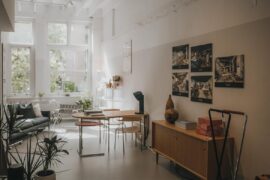
Sydney’s newest design concept store, HOW WE LIVE, explores the overlap between home and workplace – with a Surry Hills pop-up from Friday 28th November.
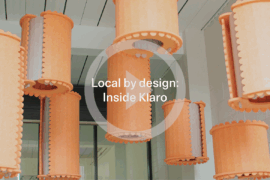
In an industry where design intent is often diluted by value management and procurement pressures, Klaro Industrial Design positions manufacturing as a creative ally – allowing commercial interior designers to deliver unique pieces aligned to the project’s original vision.

The workplace strategist and environmental psychologist was in Sydney earlier this year to give a talk at Haworth on the fallacies of the ‘average’ in workplace design.

The Director of Space Design for Haworth International for Asia and Europe tells us all about her global design journey.
The internet never sleeps! Here's the stuff you might have missed
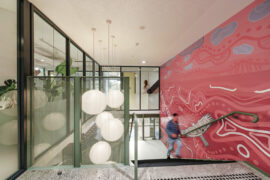
From radical material reuse to office-to-school transformations, these five projects show how circular thinking is reshaping architecture, interiors and community spaces.
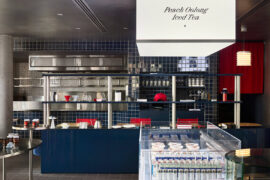
Suupaa in Cremorne reimagines the Japanese konbini as a fast-casual café, blending retail, dining and precise design by IF Architecture.
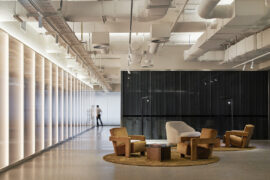
CBRE’s new Sydney workplace elevates the working life and celebrates design that is all style and sophistication.
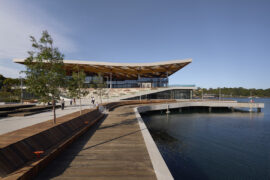
Signalling a transformative moment for Blackwattle Bay and the redevelopment of Sydney’s harbour foreshore, the newly open Sydney Fish Market demonstrates how thoughtfully designed public realm and contemporary market space can unite to create a landmark urban destination.